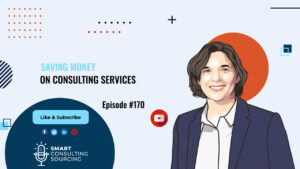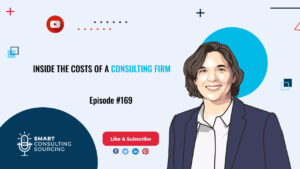Hello and welcome back to Smart Consulting Sourcing, the only podcast about consulting procurement.
I am Helene and today I’ll be talking about the ‘Digitalization of procurement: What about consulting?’
So, but before we get into that, let me give you a recap of our previous episode.
There is a multitude of reasons why executives don’t like to work with consultants. Some are based on their personal experience; some are just urban legends.
Executives don’t always understand what consulting is, what value it brings to the table. They think it is too expensive and somewhere deep down they feel like that by hiring external expertise they would showcase their lack of ability to do that job.
So, in order to make the top management accept working with the consultants, you need to convince them that will generate more impact and be seen as a smart move.
But before you do anything, keep in mind that you need to have strong relationship with every decision maker in the company and pay attention to their problems and the reasons they don’t want to hire a consultant.
Consider that these reasons are the myth conception that you’re trying to deconstruct. If you want to know more about how to get your top management to embrace working with consultant, you can listen to the entire podcast on major streaming platform or watch it on our YouTube channel.
But today, we are going to talk about the digitalization of procurement and how it applies to consulting.
So, any good surfer will tell you that the best thing to do when facing a massive wave is not to try to top it or ignore it, but rather to prepare to write it, paddle in the same direction, serve it, and when you feel comfortable add your own fears.
Management consultant had raised this principle and are extremely good at adjusting their value proposition. Just a few years ago, it would’ve been difficult to find practices in consulting firms around digital.
You could find business groups around technology in sense, but none of the large players was organized to address this emerging need.
Today, if you take a few minutes to browse the website of the same players, you get the feeling that have been in the business for ages.
So, from digital transformation to cyber security, no stone is left and through there’s ask consulting embraces digitalization, procurement remains a level intensive activity with a lot of data and paperwork to handle.
And unfortunately, like many support functions, procurement is rarely the bridge head of change in many companies. While digital transformation has started many industries and functions, procurement is still lagging.
What is digital transformation for procurement?
Digital transformation is practically relentless and touches all sectors and function. However, before we dive into digital procurement solutions, let’s be clear of what digital transformation entails.
We tend to use the terms digitization, digitalization and digital transformation interchangeably when they have different meanings. In particular for procurement.
Digitization is the conversion of your information from an analog format into a digital format. The information is digitized to a scanner, recording or even character recognition. For instance, when I was working for ENGI in the gas emergency group, we were working on digitizing of grid maps, literally scanning a paper map to map them available online.
Now digitalization is the use of active digital processes. According to Gartner, digitalization is the process of employing digital technologies and information transferred from business operations. Automation plays a big part in digitalization where some elements of the process are done automatically.
The processes are digitalized. So, to build on the previous example at some point at ENGI, we started using a brand-new software that was allowing us to have on the send maps, the conception layers and the exportation layers.
We could visualize in real time the greed including the gas flow and make calculation. And this was great to support the decision during a gas leak or a crisis for instance.
Digital transformation is not a process or a project. It’s the overall strategy of a company that is embracing digital and learning as a consequence, digitalization and digitization projects, the company of function is engaged in a digital transformation.
Obviously digital transformation is a hot topic these days and I recently had an interview on this very topic with Thomas Wiemer.
You can go check this interview. It’s one of the episodes of my new series podcast called Procurement Game Changers, where I invite pick names from the procurement industry to discuss trending topics of today.
But back to smart consulting sourcing, I said earlier that procurement still remains a labor-intensive activity with a lot of data and paperwork to handle.
Digitalization of procurement would make the purchase of consulting services all hassle free and will help to change the image of procurement from the bottleneck to a reliable and efficient partner.
When it comes to consulting, business line rarely involves procurement people in the project at the start because they do not think that consultant buyers would add strategic value to the process, which is not true in these cases.
But what does digital transformation actually mean for procurement? This means that more and more procurement processes are being conducted online using software and other digital tools.
There are many benefits to this trend, including improve efficiency, greater transparency and reduced cost. This insight, it’s important to know that not all procurement processes can and should be digitalized.
In some cases, it may be more efficient or advantages to stick to traditional methods. Ultimately, the decision of whether to digitalize procurement depend on the specific needs of the organization.
Consulting buyers are not recognized as business partners
Consulting buyers are not recognizing our business partners. Indeed, the procurement department is often seen as the black hole of the company.
A place where requests go in will never come out and it, if you are a procurement professional, you know that the job can be thankless.
You often seen as a necessary Evil by the rest of the business, and it can be hard to get respect from your colleagues. Procurement people are often not recognized as business partners.
This is because you’re usually seen as cuts, cutting suits who are only interested in the bottom line. However, procurement is changing. With the rise of digitalization, procurement is becoming more strategic and focused on creating value for the organization. As a result, procurement people are starting to play a more important role in the business.
And this is a good thing for us procurement people as it means that our, your role is evolving, and you are being given more responsibility.
However, it also means that you need to up your game and become more consultative in your approach. So by doing so, you will be better able to add value to your organizations and be recognized as true business partners.
Right tools for Digital transformation of procurement
And in order to add value, you will need certain digital tools to support the process. And this includes automating procurement processes using digital technologies to procurement data and using procurement analytics to drive decision making.
There are many different software platforms available such as SRM, negotiation and decision, contract management, procure to pay and financial performance. Supplier Relationship Management systems offer the possibility to onboard your suppliers, identify and manage your profit suppliers, mitigate supplier risk, and implement continuous improvement.
The SRM is often including in procure-to-pay and source to pay suites. So please note that supplier relationship management for consulting is crucial but unfortunately often overlooked.
Linking consulting performance to your preferred supplier list and your supplier relationship management is the first step to category management.
Most systems on the market will probably feature needs. You can have a look at leaders like Basware or challengers like SourceDay or Vizbl.
So, negotiations and decisions systems are really standalone solutions but rather integrated with strategic sourcing or source to pay solutions. They help enable bidding through real time options or reverse options to stimulate competition among your providers.
Some needs solution as Digiproc only focused on automating supplier negotiations, pricing and contractual terms. These dovetails nicely with contract management systems that integrate contracts into the spend management system.
They allow buyers to generate contract from templates, automatically populate supplier information and share documents using Word or DocuSign tool (or Adobe sign or else) while providing visibility and history during the life of a contract and managing inspiration alerts. So, you can take a peek at Pandadoc, PRM360 or i-Procure.
Next, procure to pay solutions are all in one solution, merging procurement, invoicing and payments as well as cash management in one integrated platform.
You often find rather mature companies in this category solutions as Precoro, Coupa and obviously SAP Ariba can be your answer.
Then we have financial performance solutions that replace the manual process of spreadsheet inputting, project tracking and saving estimations linked with the activity of procurement teams. It captures savings from inception to confirmation and allows the real time forecasting and reporting.
Those solution often embed as spin analysis model to slice and dice your spend as you see it. So, the mainstream players include ivalua, Spend HQ and Simphoni.
One step further in digital procurement.
According to a study by Oliver Wyman, the maturity and performance of procurement organizations can be mapped on a maturity scale with five levels from buying cheaper thanks to systematic negotiations to buying better.
When the procurement processes for sourcing and contracting become more robust to spending less. By introducing demand management, each level of the maturity scale can be reached thanks to digital technologies, RFP management, automation, sourcing alternatives, workflows, et cetera.
The most advanced maturity scale levels will first mitigate risk to more and better data on supplier’s performance and ultimately foster innovation thanks to increased collaboration and partnerships.
And by having all the digital requirements and tools in place, it can surely move up on the consulting procurement maturity grid and even be the best-in-class organization. So, what about a specialized digital solution for consulting?
So consulting is a very specific category, and most solutions were in our opinion only scratching the surface. That’s why we decided to create an end-to-end digital app that would cover all the dimensions I discussed earlier and to customize them for the consulting category.
So, we started with demand management to make sure that consulting spend would be under control and that companies would send only… we spent only on the right projects to accelerate their strategy or at least that deviating from it would be a conscious decision.
Then we created source to contract functionalities or consulting. RFP Wizard for instance is an online RFP maker that walks you through the different section of an ideal RFP for consulting services.
At the end of the process, you can download your RFP in a PDF version and either proceed with the sourcing in a traditional way or invite firms to your RFP directly on the Consource app.
And we added a module with project management connecting payments to concrete deliverables, managing potential changings to the contract and capturing the key documents for each project to capitalize on for the future.
So, we also included a performance management system to measure the impact and performance of consultants for each project using a standardized methodology called Conpass, which we the block years ago now to serve our clients.
So, this will ensure transparency, drive improvements and provide insight for negotiations.
And last we implemented a panel management module that give a real time balance score card for each consulting firm in your portfolio, allow you to drill down capability and engagement partners.
This module is integrated in our global mapping of consultant firms if you wish to compliment your panel with specialized companies.
So don’t hesitate to check out our website. The solution is called Consource, and I’d be more than happy to organize a demo if you’re interested in learning more.
In Conclusion,
To conclude today’s topic, we discuss that now is the right time for procurement to embrace digital transformation and be recognized as a strategic business partner rather than seeing as the bottleneck.
As more and more businesses move toward digitalization, procurement is one area that it often ripe for transformation.
There are many benefits to this trend, including improved efficiency, greater transparency, reduced costs.
However, it’s important to note that not all procurement processes can and should be digitalized. In some cases, it may be more efficient or advantages to stick with traditional methods.
Ultimately, the decision of whether to digitalize procurement depends on the specific needs of your organization. Digitalization is key to making procurement simple and efficient.
By automating procurement processes and using digital technologies, you can streamline the entire process and make it more efficient with technologies use such as SRMs negotiation and decisions, contract management, procure to pay and financial performance.
And by using tools like procurement analytics, you can make smart decisions that will save you time and money.
So, if you’re looking to value to your organization, don’t forget about procurement digitalization.
And that marks the end of our podcast. So, keep an eye out for me next week when I return with another fascinating topic.
Till then, stay safe and happy sourcing.
And if you have other questions about the digitalization of procurement or are curious about concerts or and procurement solution for the consulting category, remember you can always contact me directly on LinkedIn or by email because I’m always getting porn chat.
Bye and see you next week Au revoir.
See you at the next episode. Till then, stay safe and stay connected with us through our community on LinkedIn
and follow our Twitter handle @ConsQuest. Don’t forget to like and subscribe to our channels
Podbean
YouTube
Happy Sourcing!







